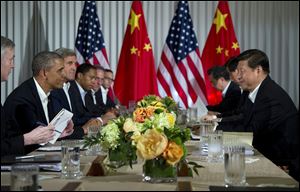
Obama opens summit with Chinese leader
Obama raises differences over economy and cybersecurity
6/7/2013RANCHO MIRAGE, Calif. — Opening a two-day summit, President Barack Obama drew attention to contentious economic and cybersecurity issues today night as he warmly received Chinese President Xi Jinping to a California desert estate for high-stakes talks.

President Barack Obama sits across the table from Chinese President Xi Jinping at the Annenberg Retreat at Sunnylands as they meet for talks.
Under a shaded walkway as temperatures surged above 100 degrees, the two leaders — in white shirts and suit coats but no ties — greeted each other and walked side by side to start their first in-person meetings since Xi took office in March.
“Our decision to meet so early (in Xi’s term) signifies the importance of the U.S.-China relationship,” Obama said. He noted the unusual setting and said he hoped for “more extended” and informal talks that will lead to a “new model of cooperation” between countries.
Previewing their talks, Obama said the United States is seeking an economic order “where nations are playing by the same rules, where trade is free and fair, and where the United States and China work together to address issues like cybersecurity and the protection of intellectual property.”
Obama, seated next to Secretary of State John Kerry, said he would also stress the importance of human rights, another sensitive issue with the Chinese.
For his part, Xi did not mention cybersecurity, human rights or North Korea, another area of potential tensions between the two powers.
Speaking through a translator, Xi said both leaders were “meeting today to chart the future of U.S.-china relations.” He added that the world has “reaped huge benefits” for the relationship between both countries.
While the summit was billed as an informal meeting, the first round of talks looked and felt like a standard diplomatic encounter. Obama and Xi sat on opposite sides of a long rectangular table, each flanked by about a dozen aides. Pairs of U.S. and Chinese flags were stationed at the head of the table and note-takers sat off to the side.
U.S. manufacturers have long contended that China is manipulating its currency to gain a trade advantage. The U.S. trade deficit with China is the largest with any single nation. The U.S. government, however, has declined to label China a currency manipulator in an effort to narrow the trade deficit through negotiation rather than confrontation.
On the issue of cybersecurity, the U.S. has started bringing its complaints about persistent Chinese computer-hacking into the open after years of quiet and largely unsuccessful diplomacy. It has accused Beijing’s government and military of computer-based attacks against America. While there have been no actual admissions of guilt, Chinese leaders have started acknowledging there is a problem and U.S. officials say the Chinese seem more open to working with the U.S. to address it.
“Inevitably there are areas of tension between our countries,” Obama said, adding that it’s in the interest of both countries to work together.
But China has asserted they, too, are often the victim of cyberattacks, including those that could be emanating from the U.S. — a line of argument that could be emboldened by new revelations that the U.S. extensively scours the Internet usage of foreign nationals overseas.
Obama, seeking to keep the issue from overshadowing the China meetings, addressed the surveillance programs for the first time hours earlier. “You can’t have 100 percent security and then also have 100 percent privacy and zero inconvenience. We’re going to have to make some choices as a society,” he said during a health care event in Northern California.
The two leaders were meeting at the 200-acre Sunnylands estate just outside Palm Springs, Calif., where they were to take questions from reporters today evening after a bilateral meeting, then hold a working dinner today night and additional talks Saturday morning.
U.S. officials see Xi, who took office in March, as a potentially new kind of Chinese leader. He has deeper ties to the U.S. than many of his predecessors and appears more comfortable in public than the last president, Hu Jintao, with whom Obama never developed a strong personal rapport.
Obama will also be looking to build on Xi’s apparent impatience with North Korea’s nuclear provocations. The U.S. has welcomed Xi’s recent calls for North Korea to return to nuclear talks, though it’s unclear whether Pyongyang is ready to change its behavior.
Xi is likely to press China’s claims of business discrimination in U.S. markets and to express concern over Obama’s efforts to expand U.S. influence in the Asia-Pacific region, which China sees as an attempt to contain its growing power.
Obama and Xi first met before the Chinese leader took office in March. They weren’t slated to meet again until September, on the margins of an international economic summit in Russia, but both countries saw a need to move up their first meeting of the year, given the myriad issues that define their relationship.